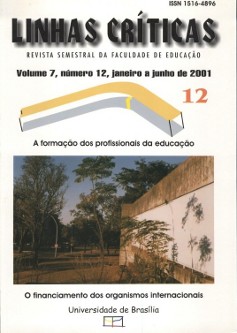Educação como estratégia política: orientação dos organismos internacionais
DOI:
https://doi.org/10.26512/lc.v7i12.2890Keywords:
Banco Mundial;, Unesco;, Política educacionalAbstract
O objetivo deste texto é analisar de que maneira os Organismos Internacionais Banco Mundial e Unesco têm desenvolvido as políticas neoliberais de redefinição do público, mais especificamente no que se refere à educação pública nos países em desenvolvimento. Para tanto, elegeu-se como metodologia a análise documental, abrangendo os documentos mais recentes desses organismos e analisando-os à luz de bibliografia selecionada. A análise de tais documentos permite identificar que a prioridade atribuída pelos Organismos Internacionais à educação deve-se ao fato de que estes a consideram como estratégia política para a redução da pobreza e instrumento para a aquisição de apoio ao desenvolvimento das políticas neoliberais.
Downloads
Downloads
Published
How to Cite
Issue
Section
License
Copyright (c) 2016 Linhas Críticas

This work is licensed under a Creative Commons Attribution 4.0 International License.
Authors who publish in this journal agree to the following terms:
-Authors maintains the copyright and grants the journal the right of first publication, the work being simultaneously licensed under the Creative Commons Attribution License which allows the sharing of the work with recognition of the authorship of the work and initial publication in this journal.
- Authors are authorized to enter into additional contracts separately, for non-exclusive distribution of the version of the work published in this journal (eg publish in institutional repository or as a book chapter), with acknowledgment of authorship and initial publication in this journal.
-Authorers are allowed and encouraged to publish and distribute their work online (eg in institutional repositories or on their personal page) at any point before or during the editorial process, as this can generate productive changes as well as increase the impact and the citation of published work (See The Effect of Free Access).



